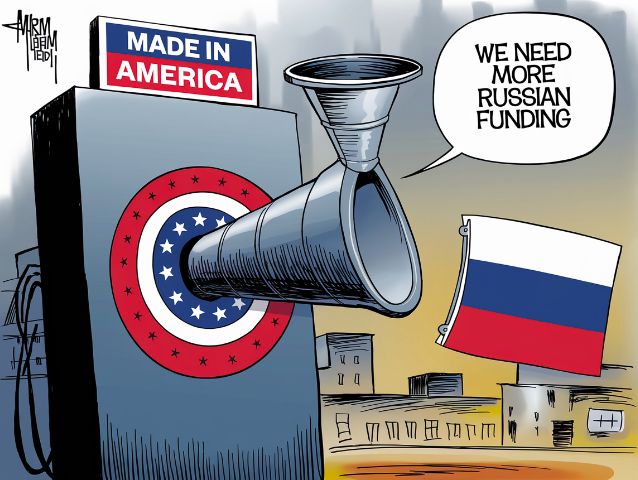Breaking News
DOJ Accuses Prominent MAGA Media Company of Accepting Russian Funding

Allegations of a prominent MAGA media company receiving millions of dollars from Russian state-backed sources have shaken the American conservative media landscape. According to a recent Department of Justice indictment, the Tennessee-based company Tenet Media allegedly accepted covert Russian funding from employees of Russia Today (RT) to influence U.S. audiences. The company's roster includes well-known right-wing commentators such as Tim Pool, Dave Rubin, and Benny Johnson.
But if these allegations hold, what does this mean for the future credibility of the company? Can a MAGA media platform survive being tied to Russian funding, especially in an era of heightened awareness about foreign interference in American politics?
The Impact of Russian Ties on Media Credibility
For any media organization, credibility is its lifeblood. A company's association with foreign influence, particularly from Russia—a country often viewed as an adversary of the U.S.—poses a serious threat to public trust. If Tenet Media is found guilty of knowingly accepting Russian funding to push propaganda or sway public opinion, the reputational damage could be devastating.
The MAGA movement, built around nationalism and a fierce rejection of foreign influence, may be particularly sensitive to such allegations. A media company promoting conservative values while potentially being bankrolled by a foreign adversary could spark backlash among its audience. The narrative would shift from being a voice for American conservatism to being an unwitting, or worse, willing participant in a Russian funding influence campaign.
The Risks of Russian Funding
Russia’s alleged interference in U.S. elections in 2016 and 2020 has left a lasting impact on American politics. U.S. intelligence agencies have consistently warned that Moscow seeks to exploit divisions within the U.S. to further its own geopolitical interests. Media companies associated with Russian funding face the risk of being branded as “agents of influence,” especially if their content aligns with Kremlin-backed narratives.
The indictment suggests that Tenet Media produced content that was “often consistent” with Russian interests, particularly regarding divisive domestic issues. This, combined with the allegations of undisclosed Russian funding, raises questions about the independence of the content. Even if the commentators themselves were unaware of the source of the money, the optics of the situation are damaging.
Could Russian Funding End Up Beneficial?
While an association with Russia is likely to damage the credibility of an American media company, there are some who might argue the opposite. From a purely financial perspective, Russian funding can provide a substantial boost to smaller, independent media outlets. With $10 million allegedly funneled into Tenet Media, the company was able to expand its influence, reach millions of viewers, and attract prominent conservative personalities.
Some might argue that as long as the content aligns with conservative values and speaks to its audience, the source of Russian funding may not matter to all viewers. After all, media companies across the political spectrum receive funding from a variety of sources, some of which may be controversial. For die-hard MAGA supporters, the message may be more important than the messenger.
The Downside of Russian Influence in US Media
Conversely, even an unintentional Russian connection brings considerable risks. The negative association with a regime known for suppressing free speech, manipulating public opinion, and destabilizing democracies around the world could turn off both advertisers and audiences. Conservative viewers who are wary of foreign influence could see this as a betrayal of the movement’s core values.
Moreover, these allegations play directly into the hands of political opponents. The Democratic Party has long warned of Russia’s influence in conservative media, and this case may validate their concerns. As such, the scandal could extend beyond Tenet Media and affect the broader MAGA movement by giving its critics more ammunition to attack its legitimacy.
Where Does Tenet Media Go from Here?
If the allegations are proven, Tenet Media faces an uphill battle to regain its credibility. The company will likely need to distance itself from any connection to Russian funding and make substantial efforts to assure its audience that it remains an independent voice for conservatism. A thorough internal investigation and public transparency about its funding sources will be critical. For now, it remains unclear how much damage these allegations will do to Tenet Media’s reputation. But in today’s hyper-partisan media landscape, any whiff of foreign interference, especially from Russian funding, is bound to raise red flags for viewers, advertisers, and political watchdogs.
Where do you draw the line for American media funding? Are Russian ties a no for you? Tell us what you think.
